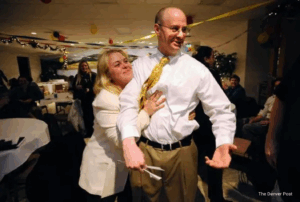Victims of Misconduct:
Tim Masters

Imagine a decade stolen. Ten years of sunrises you didn’t see, birthdays you didn’t celebrate, the ache of milestones unshared, family gatherings unseen, and the quiet comfort of your own home replaced by cold concrete and the clang of steel. All for a crime someone else committed. This nightmare is a reality for Tim Masters, who was charged with murder and rape ten years after Peggy Hettrick’s body was discovered by a cyclist in Fort Collins, Colorado.

Tim Masters during his time in the Navy.
Tim was only 15 years old at the time of Ms. Hettrick’s murder. While law enforcement and prosecutors investigated the case, Tim enlisted in the United States Navy after graduating from high school. Mr. Masters spent eight years serving in the Navy before he was honorably discharged. After that, Tim went on to work for Learjet as an aviation mechanic until 1997, when he was arrested and charged with Ms. Hettrick’s murder and rape.
Tim was convicted based on drawings found in his bedroom, which were used to conclude that he was the killer and rapist. Without any forensic evidence, eyewitness testimony, or even a false confession, he was sentenced to life in prison without the possibility of parole in 1999.
Tim Masters spent ten years in prison before it was revealed that prosecutors in his case committed misconduct by forcing a detective to arrest Tim when she did not believe she had probable cause, and destroying and suppressing massive amounts of exculpatory evidence. Some of the concealed evidence implicated the likely suspect in the rape and murder, with whom one of the prosecutors maintained a social friendship.
Tim’s sentence was vacated, and he was later exonerated in 2008 after DNA evidence proved he was not the perpetrator. Special prosecutors reviewed the withheld records and determined they were so crucial to the case that Tim would never have been convicted if they had been turned over to the defense as required.
Special prosecutors reviewed the withheld records and determined they were so crucial to the case that Tim would never have been convicted if they had been turned over to the defense as required.

The Buena Vista Correctional Complex, where Tim Masters was wrongfully incarcerated.
In 2010, Tim received a combined $10 million in settlements; $4.1 million from the Larimer County Judicial District and $5.9 million from the City of Fort Collins. The murderer was never brought to justice, and one of the likely suspects died by suicide shortly after Tim Masters was exonerated.

Terry Gilmore and Jolene Blair, the prosecutors in Tim’s case, were removed from the bench by voters.
The DAs on Tim’s case, Terrance Gilmore and Jolene Blair, had a combined 39 years of experience working as district attorneys before becoming appointed judges in 2001. They were censured by the Colorado Supreme Court in late 2008 for their failure to turn over the evidence of innocence in Tim’s case. They both acknowledged this misconduct. Neither was disciplined, suspended, disbarred or charged criminally, and in 2010, the Commission on Judicial Performance recommended both judges be retained by votes of 10-0. When the question appeared on the ballot in the next election, voters rejected the Commission’s recommendation and sent a powerful message by removing both Gilmore and Blair from the bench.
Tim’s story isn’t just a tragedy of lost time — it’s a failure of a system meant to deliver justice. Prosecutorial misconduct doesn’t bend the rules; it breaks lives. When those with the most power in the justice system act with impunity, justice becomes selective, fragile, and ultimately hollow.
If we are to believe in justice at all, we must demand more than convictions — we must demand truth, accountability, and transparency. The victim in this case, Peggy Hettrick, was tragically denied justice due to prosecutorial misconduct, and the true perpetrator was never prosecuted. Peggy’s brother, Tom Hettrick, expressed his frustration living without closure for decades while an innocent man sat in prison in a recent podcast from Crime Junkie:
“For over thirty-something years, I’ve waited around for something to take place for this. Then they take somebody and they put him in prison for 9 years, and he’s innocent as the driven white snow. They ruin his life to a certain extent. He gets out, rightfully so, and here we are, today, right now, doing this interview, and still nothing has been done about it.
And it’s like everybody just wants to turn a blind eye to it and move on. What? Move on? Well, I don’t have much longer to go because I have a disease that’ll take my life soon, and I want something done about it. I want the people that have the ability to do their job to get busy and do their job.”
— Tom Hettrick, brother of Peggy Hettrick
This lack of action from law enforcement to identify the real killer shows a deep-seated apathy toward the victim’s right to justice. This type of misconduct doesn’t just harm the wrongly accused; it also undermines justice for victims and their families and erodes public trust in the legal system.

Tim Masters and his cousin celebrate his freedom at his release party.
It’s time to stop imagining these stolen decades as someone else’s story. They are ours to reckon with, and ours to prevent. Learn more about how Protect Ethical Prosecutors is working to stop misconduct and sign the pledge to end prosecutorial misconduct.

